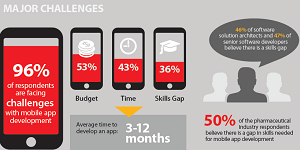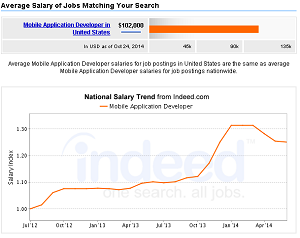News
Survey Shows Firms Confounded by Lack of Mobile App Developers
- By David Ramel
- October 24, 2014
Enterprise developers are having a tough time keeping up with the demand for mobile apps in the new "mobile-first" era, according to a new survey.
The primary problems are budget, time and a shortage of mobile developers, which have led to most organizations having a significant backlog of projects awaiting completion, according to the survey of more than 200 application development directors and managers in the United States and the United Kingdom commissioned by OutSystems. The company sells a rapid application development Platform-as-a-Service (PaaS) product designed to address mobile and Web app project backlogs.
In an age when everybody from Google Inc. to Joe's Pizza down the street seemingly needs an app to generate revenue and engage customers, it's perhaps unsurprising that half of the respondents reported a backlog of 10 to 20 mobile projects, with 85 percent having a backlog of at least one app.
A major challenge contributing to the backlog is the availability of qualified programmers, with 94 percent of respondents reporting they have a shortage of mobile development skills.
 [Click on image for larger view.]
A Snapshot of Significant Problems (source: OutSystems)
[Click on image for larger view.]
A Snapshot of Significant Problems (source: OutSystems)
"It's clear that organizations are struggling to deal with a deluge of mobile app requests, with multiple platforms to support, hundreds of change requests and complex back-end integrations," said OutSystems CEO Paulo Rosado. "To make matters worse, as demand for mobile app developers grows, companies will continue to have a challenge hiring developers. Not only will they be increasingly hard to find, they will also be increasingly expensive."
How expensive? Careers site Indeed.com reports the average salary of a mobile application developer in the United States is $102,000.
 [Click on image for larger view.]
Mobile App Developers Are Making Bank (source: Indeed.com)
[Click on image for larger view.]
Mobile App Developers Are Making Bank (source: Indeed.com)
Of course, the problem of scarce -- and thus expensive -- mobile developers isn't new, as a Forbes contributor opined more than a year ago, "The Shortage of Developer Talent Is Crushing Mobile."
Adding to the problem is the complexity of building mobile apps, which usually need to target more than one platform, such as Apple iOS, Google Android and -- in distant third place -- Microsoft Windows Phone. Enterprises can either build separate native apps, which can be time-consuming and expensive, or Web apps that work everywhere, but lack functionality and can't match native look and feel. A third hybrid approach is to use cross-platform tools that shorten project lifecycles by sharing code bases, but may not offer equivalent performance, functionality, or the exact look and feel of native apps.
The OutSystems survey mirrored other studies that found an almost even distribution of approaches.
"When asked about their preferred type of mobile app development environment, one-third voted for hybrid (33 percent), while 29 percent preferred native and 22 percent opted for HTML5/responsive design," OutSystems reported. "Sixteen percent stated that this would vary on a case-by-case basis."
Last month, this site reported on a Telerik-commissioned survey, stating, "Of those developing for mobile, the majority are focused on Web/HTML5, leaving native and hybrid app development neck-and-neck in terms of adoption."
Other highlights of the new OutSystems survey include:
- 43 percent of respondents reported time required to develop mobile apps as a major challenge, with the average project length three to 12 months.
- 51 percent have undertaken six to 10 projects in the past year; 44 percent have started one to five projects.
- Nearly 75 percent use six to 15 developers for mobile apps; 21 percent have 16 to 30 mobile developers.
- 63 percent have between 11 percent and 25 percent open vacancies for developers as a percentage of their current team size.
- When asked if they have any open mobile application developer vacancies, the top three skills respondents had challenges hiring for were Java (31 percent), JavaScript (19 percent) and .NET (17 percent).
Opinion Matters conducted the survey, polling 228 development directors/managers in the United States and the United Kingdom in August and September of this year.
OutSystems published survey results in conjunction with its release of OutSystems Platform 9. "The solution enables any developer to easily and rapidly create and deploy apps across iOS, Android, Windows Phone, and Web, from a single application design and code base," the company said in a statement. "OutSystems applications are delivered as open, standard-architecture code and insulate enterprises from future technology changes and vendor lock-in."
About the Author
David Ramel is an editor and writer at Converge 360.